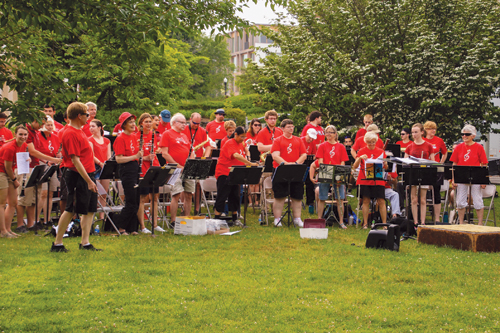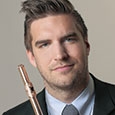
Attending a summer music festival or masterclass is a great way for aspiring professional musicians to spend their summer. Festivals provide an excellent opportunity for musicians to find new motivation and grow during what can otherwise become unproductive time between school terms. Unfortunately high tuition rates, travel expenses, time commitment, and the competitive acceptance rates into these programs may make them out of reach for many students. This does not mean that they should resign themselves to a summer of unproductivity and living vicariously through social media posts of friends who are attending these festivals. There are ways to build a personal summer music festival from the comfort of your own hometown.
Structure and Daily Routine
Perhaps the most valuable, and often the most overlooked, advantage of a summer festival is that musicians are provided with a set schedule of classes and rehearsals and all the goals that go along with it. Participants grow as musicians simply by attending rehearsals and preparing music in an allotted time. Similar to school, expectations are outlined by teachers or conductors, and success can be measured through competitions, assignments in ensembles, and performances. When musicians are removed from this structure, they often struggle to stay motivated, and their musicianship can suffer from the lack of practice and drive that follows.
To avoid the doldrums of a lack of structure, begin by making an honest list of fundamental techniques that are lacking in your playing. If you are unsure of the worth in learning something, ask yourself, “Can Emmanuel Pahud play it?” If the answer is yes, put it on the list.
My list is divided into the following categories: tone exercises, fingered exercises (such as measured trills), scales (major, minor, chromatic, pentatonic, whole tone, octatonic, blues, modal), scales in sequential patterns, intervals, extended techniques, and repertoire. Repertoire includes etudes, solos, and orchestra compositions.
From this list compile a realistic and tangible set of specific goals for your summer do-it-yourself music festival. Create a daily practice routine that mixes elements from each category. Just as if you were at a festival, set specific times to practice. Set an alarm to practice early or squeeze in an extra hour before bedtime. Do what is necessary to meet the practice goals.
For each category select appropriate materials. Explore the standard and less traditional technique books, etudes, solos and excerpts. Summer is a good time to catch up on areas in which you are behind or that need improvement.
Masterclasses and Lessons
Most summer programs offer an opportunity to learn from celebrated musicians and educators. While there is no substitute for working directly with these professionals, there are ways to learn from the greats from the comfort of your living room. At least three times a week schedule a youtube session and watch videos of masterclasses or tutorials. There are also videos of full classes taught by Jean-Pierre Rampal, James Galway, and Phillipe Bernold. Robert Dick and Greg Patillo have tutorial videos on learning extended techniques, and Alexa Still has videos on many of the standard orchestral excerpts available for free through her website. There are many others.
Search general topics such as vibrato, phrasing, breathing, and stage fright to learn what non-flutists have to offer on these topics. There are a handful of TEDtalk videos that are relevant to music and arts fields. Take notes as if you were paying to observe a masterclass at a festival. Incorporate these ideas into your daily practice.
In addition to observing classes online, make a reading list on music related topics including phrasing, performance, flute/music history, historical performance practice, Alexander Technique, and professional development. Some great books to start with include: The Simple Flute by Michel Debost, Kincadiana by John Krell, The Flute Book by Nancy Toff, On Playing the Flute by Quantz, The Inner Game of Tennis by Tim Gallway, Musicophelia by Oliver Sacks, Sound in Motion by Dave McGill, The Art of Practicing by Bruser, and This is Your Brain on Music by Daniel Levitan.
Take private lessons from different teachers to get a new perspective. Your options will depend on where you live, but start with musicians in area orchestras and teachers at local universities. If you live in an area with few options, consider a road trip to the nearest town with a large orchestra or university and take lessons from a teacher there. (Another option might be to take a lesson with an outstanding teacher of another instrument to get a different perspective.) Even if you do this just once a month, you could get several incredible lessons from teachers with varied approaches and styles by the end of the summer. It is also likely to be a fraction of the cost of a summer music festival. Many teachers also offer online lessons.
Play in Ensembles
The focus of many summer music festivals is the ensemble program. This might be the most difficult element to recreate on your own. There is no replacement for the interactive experience of performing live music under a conductor with fellow musicians. Join a local community ensemble even if it is not at a high playing level. Playing in a community flute choir or summer band will keep your skills up and usually provides the opportunity to play some fun music in a more relaxed setting. It can also be a great way to network with other musicians in your area. If you cannot find a community ensemble to join, assemble friends and colleagues to periodically read through some music.
Play with a CD
An excellent goal is to learn all the parts (flute 1, flute 2, piccolo etc.) to the standard orchestral repertoire and then play each part with a CD performed by a professional orchestra. I recommend blasting the music so it feels like you are playing in the middle of the orchestra. This can be challenging without a conductor, but it teaches you to listen to the other parts in the orchestra, especially during long rests. A great place to start is with symphonies in public domain including those by Haydn, Mozart, and Beethoven. Learn two symphonies a week and at the end of the week give a performance with your favorite orchestral recording. For example, you could work through all of the Beethoven symphonies over the course of the summer, something that you would not accomplish at most summer music festivals.
Attend Concerts
Attending concerts is another great part of summer music festivals. Check out the live performances in your area. Often there are a variety of free outdoor concerts. If you can’t attend live performances, find online videos of standard repertoire performed by great orchestras of the world. (I would also recommend purchasing a subscription to the Berlin Philharmonic’s concert streams.) Make the video watching a social event. Invite your friends to watch with you. Serve refreshments and drinks, turn down the lights, and watch the performances as if you were having movie night. Create a diverse program of standard orchestral, chamber, and solo programming. Try to do this every weekend over the summer.
The Final Concert
Summer music festivals end with a bang, so set a goal of giving a performance at the end of your summer. Collaborate with a pianist to give a full flute recital, perform a concert of solo flute works, or perform with a chamber ensemble. Find a local school or church to host the concert or use your own living room. For larger performances, use the experience to learn how to make programs, write program notes, and advertise the event.
Parting Thoughts
As a student, I always worried that if I did not attend the best music festivals, I was shooting myself in the foot. The flute players at those festivals were sure to get better than me, and there was little I could do about it. Your situation is really what you make of it. Summer music festivals are great, but it still takes individual practice and discipline to get the most out of that opportunity. Creating your own summer music festival is not only a way to stay motivated and improve your skills, but it is an exercise in discipline and personal drive which are qualities that the best musicians all seem to share.






